The message from the currency markets: buy Europe
Investors, who already view the US as overpriced and the eurozone as cheap may be about to start piling money into both European stocks and the euro, says John Stepek.

Get the latest financial news, insights and expert analysis from our award-winning MoneyWeek team, to help you understand what really matters when it comes to your finances.
You are now subscribed
Your newsletter sign-up was successful
Want to add more newsletters?

Twice daily
MoneyWeek
Get the latest financial news, insights and expert analysis from our award-winning MoneyWeek team, to help you understand what really matters when it comes to your finances.

Four times a week
Look After My Bills
Sign up to our free money-saving newsletter, filled with the latest news and expert advice to help you find the best tips and deals for managing your bills. Start saving today!

I find currency markets fascinating.
To my mind, they're like the tectonic plates of the market. A lot of the trends you see appearing in the stockmarket start out as rumblings in the currency markets.
They're also the place where political events and macroeconomic surprises and all the "big picture" stuff tends to show up first. When markets have concluded that the overall "story" has changed, this is often where you'll see it.
MoneyWeek
Subscribe to MoneyWeek today and get your first six magazine issues absolutely FREE

Sign up to Money Morning
Don't miss the latest investment and personal finances news, market analysis, plus money-saving tips with our free twice-daily newsletter
Don't miss the latest investment and personal finances news, market analysis, plus money-saving tips with our free twice-daily newsletter
This has been a particularly busy week in terms of "big picture" stuff. It looks as though we might have seen a couple of turning points.
So this week, I wanted to take a quick run down of the major currencies and see where we are.
The path of least resistance for the euro is up
Firstly, let's turn to Europe. Emmanuel Macron won the first round of the French presidential election, and will stand against Marine Le Pen in the second round in May. Markets have concluded that Macron will win. And not only that, they seem to be concluding that he'll also be a pretty good leader for the French economy.
All of these things may or may not be true (I suspect they're getting over excited about the potential for change). But for what it's worth, I also agree that Macron will win.
It's easy to fall for the idea that because Donald Trump won, and because Brexit won, that Le Pen will somehow pull it back from the brink. After all, the polls were wrong then, weren't they?
But what this ignores is that actually, the polls weren't especially wrong in Trump's case he always had a decent chance of winning, it's just that the dominant narrative found it so inconceivable that it hadn't caught up with that idea.
As for Brexit the polls there were flat out wrong (according to data uber-geek Nate Silver, British pollsters have a specifically poor record) But it was also always a much tighter vote than anyone had really given it credit for.
There is far more clear blue water between Macron and Le Pen than in either of the previous two cases.
Put it this way Le Pen could still win. Anything is possible. But it is both rational and reasonable to price in a high chance that Macron will win. You couldn't have said that about either side in the US election, or in the UK referendum debate.
What does that mean for markets? Well, my hunch is that investors, who already view the US as overpriced and the eurozone as cheap (in relative, if not absolute terms), will take this as the cue to pile in to Europe. So you'll see more money going into both European stocks and the euro, pushing it higher.
Certainly, that's what's happened this week as the chart of the euro versus the dollar shows below.
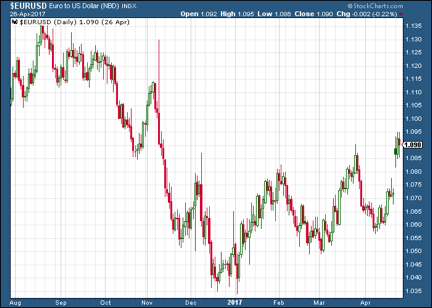
It goes back nine months. You can see that, as Trump mania and fear of Le Pen have both worn thin, since the start of 2017, the euro has been climbing against the dollar. That gap higher at the end there is when markets decided that Macron was going to clinch it.
However, the European Central Bank (ECB) is keeping a close eye on the currency. ECB boss Mario Draghi was quick to try to knock any rally on the head by painting a gloomier-than-strictly-necessary picture of the eurozone economy at the ECB's press conference on Thursday.
Draghi is good, probably the most effective central banker on the planet right now (whether you agree with what he does or not that's a separate question). He'll probably be able to keep the euro from rocketing.
However, at best he'll be slowing its acceleration rather than causing it to reverse trend. I'd argue that the path of least resistance now is for the euro to keep rising (obviously, if Le Pen wins, all bets are off, but that's where we are now).
The pound looks forward to the election
So that's the euro. What about the pound? Sterling has also had a new lease of life, particularly against the US dollar, as you can see below.
GBP/USD
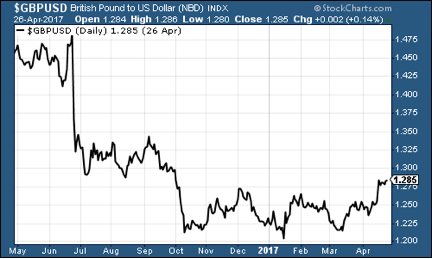
It's also held up against the euro, although Macron-mania has seen it pull back from its pre-French election surge.
GBP/EUR
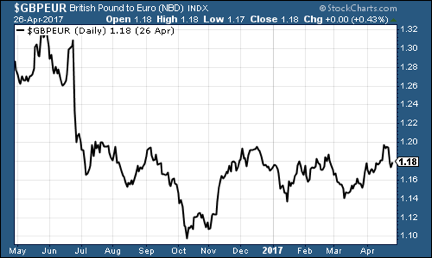
Again, the rebound in sterling is down to the prospect of more political clarity and a relatively market-friendly government.
Most of you reading this are probably based in the UK, which makes it harder to escape distracting media and cognitive bias as to what might happen in the election. But it's clear to any moderately independent observer that the Conservatives are highly likely to win the election.
The questions all hover around peripheral issues, such as: will the SNP lose enough seats to put the second referendum question to bed? And how long will Jeremy Corbyn manage to cling on as Labour leader once the results are in? (I'm betting longer than anyone expects in fact, after having a chat with my colleague Matthew Partridge, I took a punt with William Hill at 5/4 odds, that he'd cling on until at least 23:00 on 9 June but we'll see).
What's next for the pound? Momentum is behind sterling, and I suspect it'll strengthen further. A lot of people were short the pound, while a lot of others were looking for the right time to turn bullish that's a potent combination and this morning, sterling was heading for the $1.30 mark.
However, I'm not sure how much further the pound will get. Polls might cause a few bumps, but there are a couple of bigger issues. One, the housing market is looking a little tired, and that's usually a bad sign for the UK economy.
The latest Nationwide data shows that house prices have fallen for two months in a row, and the annual rate of house price inflation is down to 2.6% - the slowest in four years and close to, or even, negative in real' terms, depending on which inflation measure you favour.
Secondly, I'm not sure the government or the Bank of England really wants a stronger pound. We're tentatively starting to see the benefits of a weaker currency coming through to the manufacturing sector and if that gets reversed, then the goal of rebalancing the economy away from consumption and finance and towards "making stuff" which, after all, is one of the drivers behind Brexit might struggle.
But for now, the momentum is certainly behind the pound. I just think that it could be vulnerable to any surprises that crop up in the coming months.
The Bank of Japan will keep the yen weak
Japan has been pootling along in the background somewhat this year, with a lack of political drama keeping it off the front pages. The Japanese yen has been steadily strengthening against the US dollar, mainly because of weakness in the US currency, rather than yen strength.
However, as the chart below shows, the yen has weakened somewhat in recent weeks.
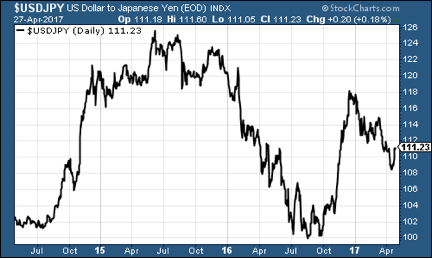
This is partly down to concerns over Japan's proximity to North Korea, says Kathleen Brooks of City Index. But it's also because the Bank of Japan has no intention of letting up on its loose monetary policy, as it confirmed on Thursday's meeting.
The central bank has pinned its hopes on loose monetary policy to keep the yen weak, and I don't see that changing any time soon. The dollar may continue to weaken but it's hard to see the Bank of Japan taking that lying down. That's good news for Japanese stocks.
The six (regular) charts that matter
What about the US dollar? Well, let's turn to our weekly review of the charts that matter for more on that.
US dollar index
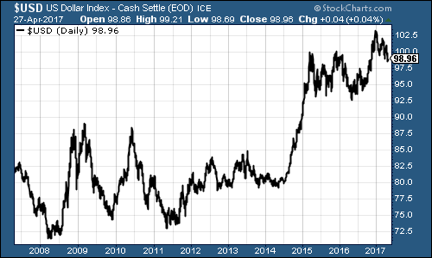
The weak dollar story is continuing. Markets are losing faith in Donald Trump. His big announcement on tax turned out to be a shortened, reheated version of his previous plan. It has no chance of being passed by Congress, which means markets can pretty much ignore it.
Meanwhile, the rising euro has a particularly significant effect on the US dollar index, as it comprises the majority of it.
Given that we can't have all of the world's currencies falling at the same time, my bet would be that it's the euro's turn to take the strain of being the main "strong" currency for a time, and that the dollar probably has still further to fall.
Overall, that would suit stockmarkets and is probably something that the Trump administration would be quite happy with too.
Gold
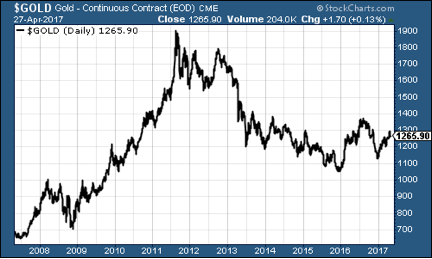
Gold has had a tougher week as risk appetite has recovered amid the French election results. No one wants to be invested in boring old gold when there's the prospect of gains to be made elsewhere.
Ten-year US Treasury bonds
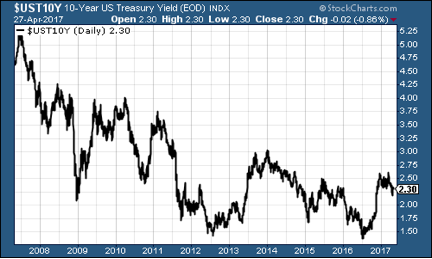
Yields are picking up slightly we're still a long way off the 2.6% "danger area" that came into view earlier in the year, but it's a sign that investors are getting their "animal spirits" back, despite the Trump disappointment.
Copper
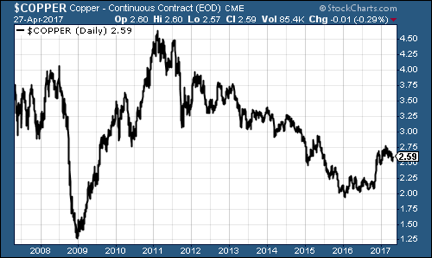
That also appears to be confirmed by our fourth chart, copper. The price has picked up in the past week after declining somewhat over the past month.
Bitcoin
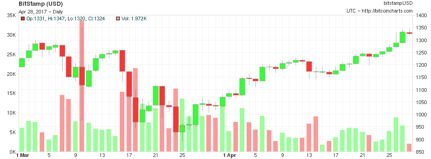
Source: bitcoincharts.com
Having had a bit of an existential crisis at the end of last month, things are really looking up for the cryptocurrency again.
I'll freely admit that I am a bitcoin amateur. But my colleague Charlie Morris (editor of The Fleet Street Letter) is an interested and intelligent observer of the bitcoin field.
In his latest Atlas Pulse newsletter, he notes that the recent problem with scaling up bitcoin may have found a solution in the form of "Segwit". He now reckons that bitcoin will never trade below $1,000 a coin again, and that a target price now is closer to $1,700.
Obviously, this is a highly speculative sector and I have no significant exposure to it. But it's interesting to watch, particularly at a time when central banks are still quietly competing with one another to undermine their own currencies.
US jobless claims data
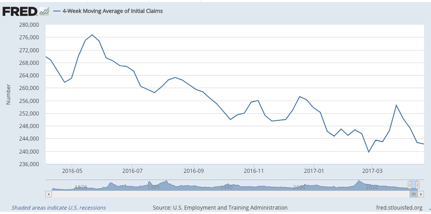
To recap, David Rosenberg of Gluskin Sheff sees this is a valuable leading indicator. When the figure hits a "cyclical trough" (as measured by the four week moving average), a stock market peak is not far behind, and a recession follows about a year later.
As the short-term chart aboveshows, it did look as though jobless claims troughed at just under 240,000 at the end of February. So we'd be looking at the market (the S&P 500) peaking around the end of May.
In the last few weeks, jobless claims have been falling back again, and we're not far off that trough seen earlier this year. But the figures for this week surprised forecasters, and not in a positive way coming in at 257,000 versus expectations for 242,000. That's dragged the four week average back up a bit.
Get the latest financial news, insights and expert analysis from our award-winning MoneyWeek team, to help you understand what really matters when it comes to your finances.

-
 Should you buy an active ETF?
Should you buy an active ETF?ETFs are often mischaracterised as passive products, but they can be a convenient way to add active management to your portfolio
-
 Power up your pension before 5 April – easy ways to save before the tax year end
Power up your pension before 5 April – easy ways to save before the tax year endWith the end of the tax year looming, pension savers currently have a window to review and maximise what’s going into their retirement funds – we look at how